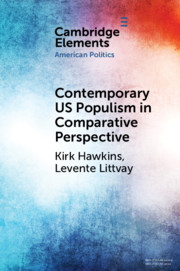Element contents
Contemporary US Populism in Comparative Perspective
Published online by Cambridge University Press: 07 May 2019
Summary
- Type
- Element
- Information
- Series: Elements in American PoliticsOnline ISBN: 9781108644655Publisher: Cambridge University PressPrint publication: 30 May 2019
References
- 52
- Cited by



